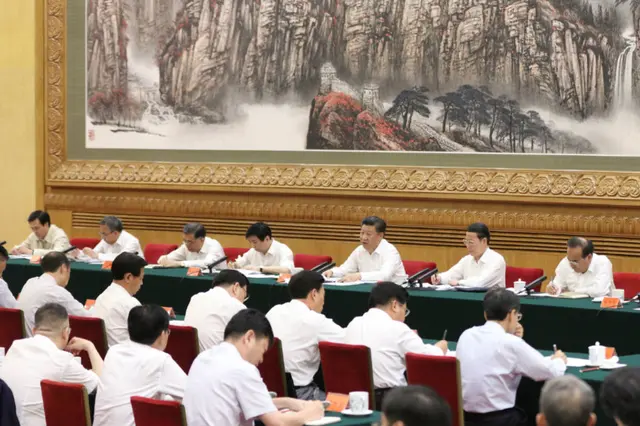President urges proactive role in implementing projects along routes to provide a "sense of gain"
China is willing to give other countries "a ride" as it renews ties, via the Belt and Road Initiative, with nations along the old Silk Road routes, President Xi Jinping said on Wednesday.
As the second-largest economy in the world, China should be "more proactive" in dealing with other countries, Xi told a meeting attended by government officials, entrepreneurs and scholars.
The president encouraged Chinese companies to invest in countries along the routes of the Belt and Road Initiative, also known as the Silk Road Economic Belt and the 21st Century Maritime Silk Road.
He also said China welcomes investment from those countries.
According to Xi, more than 100 countries and global organizations have participated in China's Belt and Road Initiative, and more than 20 countries have worked with China in production capacity cooperation in such areas as railway construction and nuclear power.
The president urged the implementation of Belt and Road projects to ensure that the countries involved have "a sense of gain".
The export of China's production and construction capacity could support the Belt and Road countries to push forward industrialization and will help to stabilize the world economy, he said.
The Silk Road Economic Belt is a land-based route from China through Central Asia and Russia to Europe. The 21st Century Maritime Silk Road is a strategic route through the Strait of Malacca to India, the Middle East and East Africa.
The Belt and Road Initiative, proposed by Xi in 2013, began to take shape in 2014 with a focus on infrastructure.
Xi has made state visits to a number of countries, including the Czech Republic, Serbia, Poland and Uzbekistan, along the Belt and Road routes this year. More than 30 countries and international organizations have signed agreements and memorandums of understanding with China on jointly implementing the Belt and Road strategy.
As part of the Belt and Road projects, freight trains have made more than 2,000 trips from China to Europe and back on 39 rail lines, according to the Foreign Ministry.
Wang Licheng, board chairman of Hangzhou-based Holley Group, said at the meeting that the Thai-Chinese Rayong Industrial Zone, jointly developed by Wang and his partners in Thailand, has created more than 20,000 jobs for people in Thailand's east coastal region.
The company plans to build an occupational school near the industrial zone to train more skilled workers, a proposal that has been welcomed by Thai authorities, he said.
The entrepreneur suggested that the construction of industrial parks abroad should be set as China's national strategy, with supportive policies established to encourage private companies to expand business overseas.
Liu Weidong, director of the Belt and Road Strategy Institute of the Chinese Academy of Social Sciences, said that through the Belt and Road strategy, China could allocate global resources and provide services for the whole world.
Wang Yiwei, an expert on European studies with Renmin University of China in Beijing, said that through the Belt and Road projects, China could share its development experience with other countries as well as find new markets for its production capacity.
Countries in the Central and Eastern Europe region are eager to develop ties with China to attract more Chinese investment, and President Xi's state visits to the CEE countries in March and June have brought results, he said.
(CHINA DAILY)
 简体中文
简体中文

